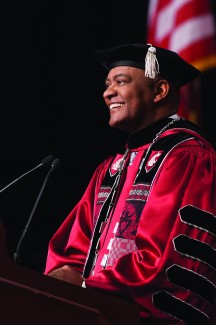John Gardner, vice president for development at Washington State University, said the State of Washington will miss the presence that the late WSU President Elson Floyd had as a voice for higher education.
“This is a person who put the public’ back in public higher education,” Gardner said.

Courtesy photo by WSU Photos
WSU President Elson Floyd died the morning of June 20 due to complications with colon cancer at the age of 59.
Floyd passed away due to complications with colon cancer at the age of 59 on the morning of June 20. Floyd served as president of WSU since 2007. Previous to that, he was the president of both the University of Missouri System and Western Michigan University.
Gardner said he worked together with Floyd both at Missouri and at WSU. He said from the moment he first met Floyd in 2002 he couldn’t help but notice the magnetic energy and charisma he had in commanding a room full of people he didn’t even know.
“He had that kind of charisma to make contact with many people,” he said. “It was a moment I’ll never forget I think he was like that for lots of people.”
Gardner also noticed that Floyd learned from every experience and never made the same mistake twice, he said.
Kathy Barnard, executive director of University Communications, said she would have to take up pages upon pages of space just to list all of the accomplishments Floyd made that impacted WSU.
“Overall what he did was help our institution understand and really have the confidence to know that we can be much more than we thought we could be,” Barnard said.
One of the biggest moments of Floyd’s legacy at WSU was his work to establish a medical school.
“After the legislature signed off on our request to be able to pursue our own medical school I met him in the hallway late in the day, and he was so happy and so satisfied,” Barnard said. “We just had a conversation about how important it was and how we were going to move forward.”
Joan King, associate vice president and chief university budget officer, said a medical school was something that people claimed could never happen at WSU, but somehow Floyd made it happen. She said because of all of the effort Floyd put into it, she didn’t feel surprised when it was finally approved by the legislature.
King said she was consistently impressed with all the feats Floyd managed to achieve during his time at WSU. She said he was inducted as WSU’s president right before the U.S. started experiencing huge economic issues and she got to see how he worked with all of the budget issues the school was hit with.
Despite it being a struggle, King said Floyd performed well in a time of crisis and afterward he continued to work hard to increase salaries for faculty and staff.
“He was the best boss I’ve ever had,” King said.
King said Floyd was also student-focused throughout his presidency. She said he once told her that when he was a student at the University of North Carolina at Chapel Hill, members of his college’s administration would walk past him without noticing him, and it made Floyd feel invisible. He made a point to notice and talk to WSU students when he saw them, even if it was just passing by them on a sidewalk, King said.
As a result, WSU students loved Floyd, King said. They referred to him by his affectionately given nickname “E-Flo,” which originated during his presidency at Missouri. During commencement ceremonies, King said Floyd would shake every graduate’s hand and even give some big hugs.
“When President Floyd would come in (at commencement) the students would just erupt in cheering, because they loved him,” King said. “And as he walked down the aisle then, students would jump up and hug him they would shake his hand — and of course he shook all the graduate’s hands at all the commencements.”
King said Floyd was just popular with the students, but with the faculty and staff of WSU as well. He was simply an enjoyable person to be around, she said.
“He was a southern gentleman in the true sense of the word,” King said. “He was courteous and gracious and graceful and able to work with anybody.”
Barnard said as of now Daniel Bernardo will serve as the interim president while the WSU Board of Regents creates a task force to find the school’s next permanent president.
A celebration of Floyd’s life and legacy will be held on Aug. 26 at the WSU Beasley Coliseum.
Erin Bamer can be reached at [email protected] or on Twitter @ErinBamer
